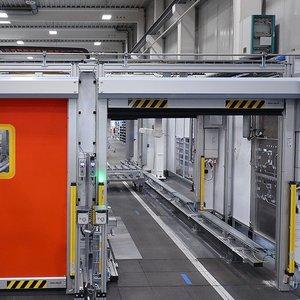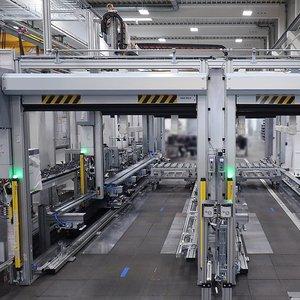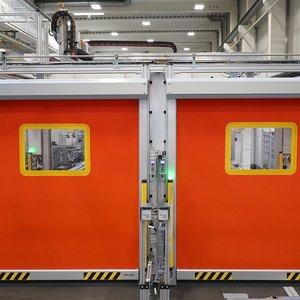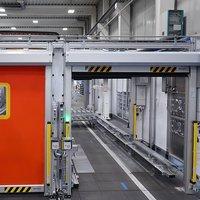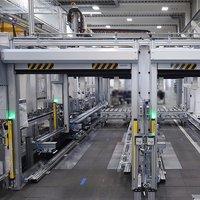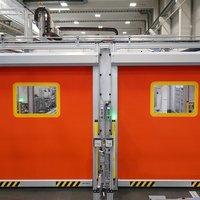Unloading and reloading station for AGVs in the production of electric drives
Task
In the production plant of an automobile manufacturer, components for electric drives need to be fed into the fully automatic assembly process. The workpieces are packaged in trays. Several of these trays are stacked on a pallet, which in turn is placed on a large load carrier. This is a steel trolley on heavy-duty castors. The trolley measures 1200 x 1000 mm and can carry a total load of up to 900 kg.
These large load carriers serve as load bearing equipment for automated guided vehicle (AGV) systems, with which they are transported to the corresponding process station. The large load carriers must be subsequently transferred to an unloading and reloading station. The large load carriers are buffered in the station and precisely positioned for the restacking and unloading of the trays. The carriers must then be transferred back to the AGV for removal. The large load carriers may also be transported by forklift or transported manually by the worker to the transfer position. An entry pod with a redundant authentication mechanism must be implemented to ensure a high level of personal security.
The unloading and reloading station needs to be designed for 3-shift operation and must comply with the equipment regulations of the automotive industry.
Solution from mk
Various stations with different dimensions were created in several orders. A station consists of one or more parallel lines with a different number of buffer and positioning stations and each with two security entry pods, one for the infeed and one for the outfeed.
At the beginning of a line, the AGV or the worker is identified by the access protection (light barrier with muting function) and the high-speed roller gate on the entry pod opens. The large load carrier is transported into the entry pod, aligned and passed to a stationary transport system. A roller carriage with cams is guided along the line on a linear module with gear rack and recirculating ball. This pulls the large load carrier through another high-speed roller gate into the buffer and unloading area. Initially in the waiting position, the large load carriers are then accurately positioned in the alignment stations. A 3-axis portal or 6-axis robot can now remove the workpieces and transfer them to the appropriate process station. The empty trays are restacked and collected on the first available large load carrier. Once the large load carrier is filled with empty trays and is ready to be removed, it is transferred into another entry pod and then handed over to an AGV or a worker.
The entire station is also surrounded by a wire mesh protective fence between entry pods.
Benefits for the customer
- Flexible adjustment of the dimensions to different workpieces or large load carriers
- Conveyor system and guarding from a single source
- Interlinking with the entire system via interfaces that offer process reliability
- Designed in accordance with standards and equipment regulations
Products used
> Linear technology
> Profile system
> Guarding

